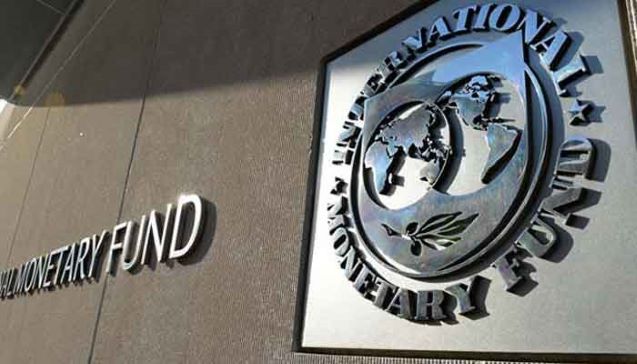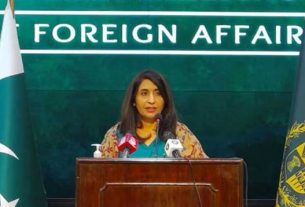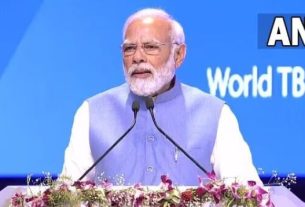Pakistan has “fulfilled all the conditions” of the International Monetary Fund (IMF) for the release of the $1.1 billion tranche, Finance and Revenue Minister Senator Ishaq Dar said on Monday, hoping the Fund will soon sign the staff-level agreement.
Both sides have been engaged in multiple talks since February to break impasse on the pending ninth review of the Extended Fund Facility (EFF) of the bailout package at a time when the timeframe of the 10th review is in sight.
The global lender has placed multiple conditions that include domestic revenue generation from taxation and tariffs, waiving subsidies and external financing from friendly countries.
Dar told a news channel that both Saudi Arabia and the United Arab Emirates (UAE) had informed the IMF about their commitments to provide $3 billion to Pakistan. Riyadh will provide $2 billion while Abu Dhabi has promised $1 billion to Pakistan, Dar said, adding that the Washington-based lender has also been informed in this regard.
The finance minister said all the conditions for the staff-level agreement between Pakistan and IMF have been fulfilled, adding Pakistan was hopeful that Fund would soon sign the SLA and get it approved by its Executive Board.
The country’s foreign exchange reserves have fallen to cover barely a month of imports after the IMF funding stalled in November, hit by snags over fiscal policy adjustments after officials of the lender visited Islamabad in February for talks.
They formed part of a ninth review exercise on a bailout package of $6.5 billion agreed upon in 2019 whose resumption is critical for Pakistan to avoid risking default on external payment obligations.
Pakistan had to complete actions demanded by the IMF, such as reversing subsidies in its power, export and farming sectors, hikes in the prices of energy and fuel, and a permanent power surcharge, among other measures.
The IMF programme will disburse another tranche of $1.4 billion to Pakistan before it concludes in June this year.
IMF expects ‘do more’ despite all-out efforts to clinch deal
Though the International Monetary Fund (IMF) has welcomed bilateral assistance confirmation to Pakistan but sought further assurances to seal the deal with the Shehbaz-led government.
The Pakistani delegation and IMF staff reached an agreement to maintain strong policies and secure sufficient financing to support the implementation efforts.
“The IMF is supporting these efforts and looks forward to obtaining the necessary financing assurances as soon as possible to pave the way for the successful completion of the 9th External Fund Facility review,” an official statement said.
Welcoming the commitments made by the Pakistan’s friendly countries helping the cash-strapped country revive the much-needed loan programme, IMF Mission Chief for Pakistan Nathan Porter said that Islamabad and global lender had agreed to continue the ongoing economic policies in the recent meetings. Both sides had also agreed to arrange adequate funds to implement these policies.
He said the IMF backed the efforts being made by the Pakistani officials to secure the financial assurances from friendly states as they will help it complete the ninth review under the Extended Fund Facility (EFF).
A day earlier, Finance Minister Ishaq Dar confirmed that the United Arab Emirates agreed to financial support of $1 billion to Pakistan, removing a key hurdle to securing a much-awaited bailout tranche from the IMF.
The commitment is one of the IMF’s last requirements before approving a staff-level pact to release a tranche of $1.1 billion, delayed for months, that is crucial for Pakistan to resolve an acute balance of payments crisis.
“The State Bank of Pakistan is now engaged for needful documentation for taking the said deposit from UAE authorities,” Finance Minister Ishaq Dar said on Twitter, referring to the central bank.
The pledge makes the UAE the third country, after Saudi Arabia and longtime ally China, to come to Pakistan’s assistance, as external financing is needed to fully fund the balance of payments gap for the fiscal year that ends in June.
“The UAE deal should be helpful because the IMF has been saying Pakistan should secure financing from ‘friendly’ nations,” said Seaport Global EM credit analyst Himanshu Porwal.
“It is still far from over though. The IMF is saying that they (Pakistan) are in breach of certain targets. The fiscal deficit for example is seen peaking at around 8.3% (of GDP), so almost double what they were expecting,” he added.
Pakistan’s bonds, which have slumped nearly 70% over the last year as the country’s troubles have mounted, climbed for a second day running on the confirmation. The rise was almost 5% for its bond with closest payment date – April 15 next year – taking it to almost 50 cents in the dollar, compared to 46 cents a few days ago.
On Thursday, the IMF’s managing director, Kristalina Georgieva, said the fund was also in talks with nations friendly to Pakistan to secure financial assurances vital for the programme.
Pakistan’s foreign exchange reserves have fallen to cover barely a month of imports after the IMF funding stalled in November, hit by snags over fiscal policy adjustments after officials of the lender visited Islamabad in February for talks.
They formed part of a ninth review exercise on a bailout package of $6.5 billion agreed in 2019 whose resumption is critical for Pakistan to avoid risking default on external payment obligations.
POLICY AND FISCAL MEASURES
Pakistan had to complete actions demanded by the IMF, such as reversing subsidies in its power, export and farming sectors, hikes in the prices of energy and fuel, and a permanent power surcharge, among other measures.
These steps included jacking up its key policy rate to an all-time high of 21%, a market-based exchange rate, arranging for the external financing, and raising more than 170 billion rupees ($613 million) in new taxes.
The fiscal adjustments have already fuelled Pakistan’s highest inflation ever, which climbed in March to more than 35% on the year.
A final issue to be resolved is a fuel pricing scheme meant to bring relief to Pakistan’s lower middle class and poor from crippling inflation. The IMF has asked how it will be funded.
The IMF programme will disburse another tranche of $1.4 billion to Pakistan before it concludes in June.
Funds from the lender will also unlock other bilateral and multilateral financing for the cash-strapped country.
Neighbouring China has rolled over $2 billion and refinanced another $1.3 billion in recent weeks.
On Friday, Pakistan’s central bank is set to receive a third and final disbursement of $300 million from the refinancing by the Industrial and Commercial Bank of China, Dar added.
Programme loans from other multilateral agencies await completion of the IMF review, central bank governor Jameel Ahmad told investors in Washington at the spring meetings of the lender and the World Bank.
Measures such as a hike of 1,400 basis points in interest rates over the last 18 months have put the nation of 220 million on a path to macroeconomic stability, added Ahmad, who hoped for inflation to start decelerating over the next few months.
The government is pursuing a contractionary fiscal policy, with the primary balance in surplus so far compared to a deficit last year, he added.
PM asks nation to decide future course sans foreign debts
Prime Minister Muhammad Shehbaz Sharif on Saturday said that there existed economic challenges but the nation would have to decide whether they would live on foreign debts or to stand on its feet by carving a niche among the comity of nations with honesty, dedication and hard work.
The prime minister expressed the optimism that despite different challenges, Pakistan would be soon out of all difficulties.
The country was not created to move on debts and act like beggar because their forefathers and different generations had given sacrifices for the motherland, he added.
The prime minister referred to the terms of International Monetary Fund (IMF) for seeking loan agreement and said that they did every effort to implement them.
Even, they sought bilateral financial support from the friendly nations including China that realized their problems and provided a rollover of $2 billion loan besides, returning back previous debt amount paid back by Pakistan.
The prime minister also expressed his gratitude to Saudi Arabia and the United Arab Emirates. The UAE had committed a loan of $3 billion.__The Nation





